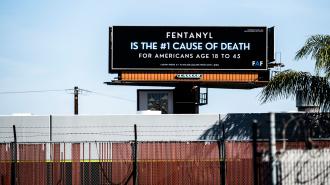The FDA has approved a new nasal spray to reverse opioid overdoses, particularly those caused by fentanyl.
The spray, called Opvee, is a new delivery vehicle for nalmefene, a drug that was approved in the 1990s in injectable form but was pulled from the market due to low sales, the AP reported. It was approved for use in patients 12 and older as an emergency medication for people suffering an opioid overdose.
The approval “places a new prescription opioid reversal option in the hands of communities, harm reduction groups and emergency responders,” FDA commissioner Robert M. Califf said. The news comes a couple months after the regulatory body approved an over-the-counter version of naloxone nasal spray, also known as Narcan.
The newly approved spray, called Opvee, is approved for patients 12 and over suffering an opioid overdose.
Both drugs work by essentially blocking opioids effects in the brain, restoring victims’ breathing and blood pressure.
In clinical trials, nasal spray nalmefene matched Narcan in performance, FiercePharma reported, prompting the drug’s maker, Indivior, to apply for approval and secure a fast-track designation. Indivior also makes the opioid treatment drug Suboxone.
Nalmefene vs. Narcan: After two massive leaps during the pandemic, US opioid overdose deaths again ticked up slightly in 2022, the AP reported, with over 109,000 deaths.
Fentanyl and other synthetic opioids now make up the lion’s share of overdose deaths, which has inspired a new look at nalmefene. Fentanyl stays in the body longer than heroin or other opioids, meaning multiple doses of Narcan may be needed to reverse the overdose — so researchers looked to develop an overdose spray potentially better suited to the synthetic opioids.
“The whole aim of this was to have a medication that would last longer but also reach into the brain very rapidly,” Nora Volkow, director of the National Institute on Drug Abuse, told the AP.
But opioid reversal drugs can cause an especially nasty side effect: the rapid onset of withdrawal symptoms like nausea, cramps, and anxiety. Obviously, saving a life is more important than withdrawal, but especially prolonged symptoms may make doctors reluctant to use this treatment instead of Narcan.
Fentanyl stays in the body longer than heroin or other opioids, meaning multiple doses of Narcan may be needed — so researchers developed Opvee to be potentially better suited to the synthetic opioids.
Whereas Narcan may cause these effects to last for a half hour or so, nalmefene — because it is longer lasting — could extend the unpleasantry for six hours or more, Rutgers University emergency medical physician Lewis Nelson told the AP. That means extra treatment from already-strapped healthcare providers.
“The risk of long-lasting withdrawal is very real and we try to avoid it,” Nelson, who used to advise the FDA on opioids, told the AP. “We’re not suffering from a naloxone shortage where we need to use an alternative. We have plenty of it and it works perfectly well.”
Indivior plans to roll out Opvee in October at the earliest.
We’d love to hear from you! If you have a comment about this article or if you have a tip for a future Freethink story, please email us at [email protected].






